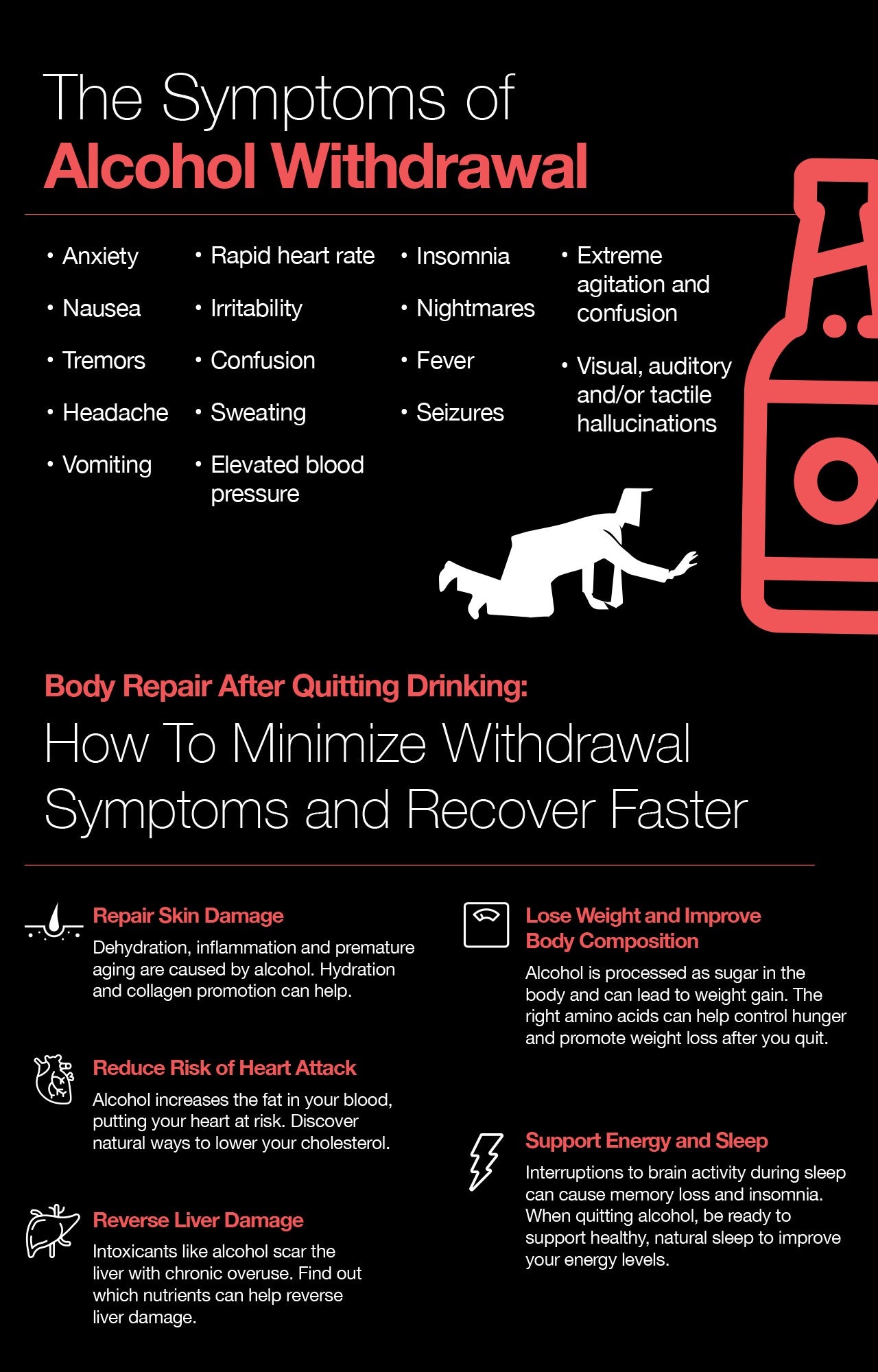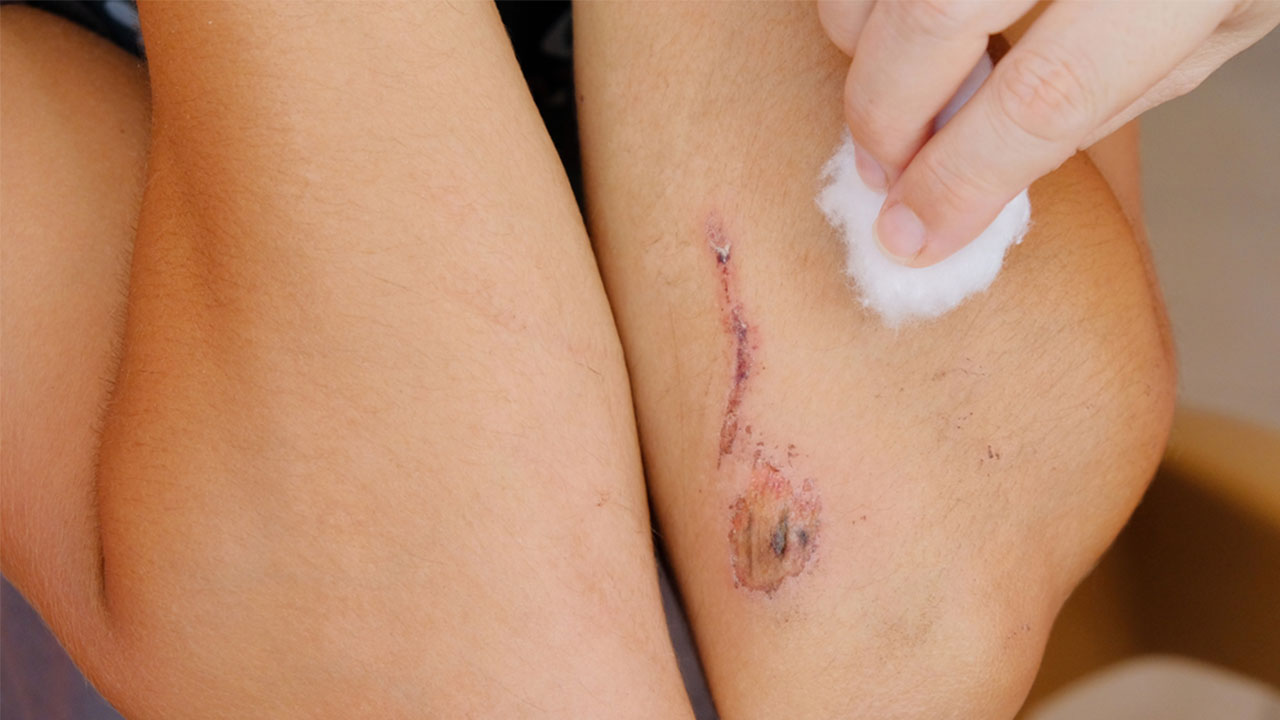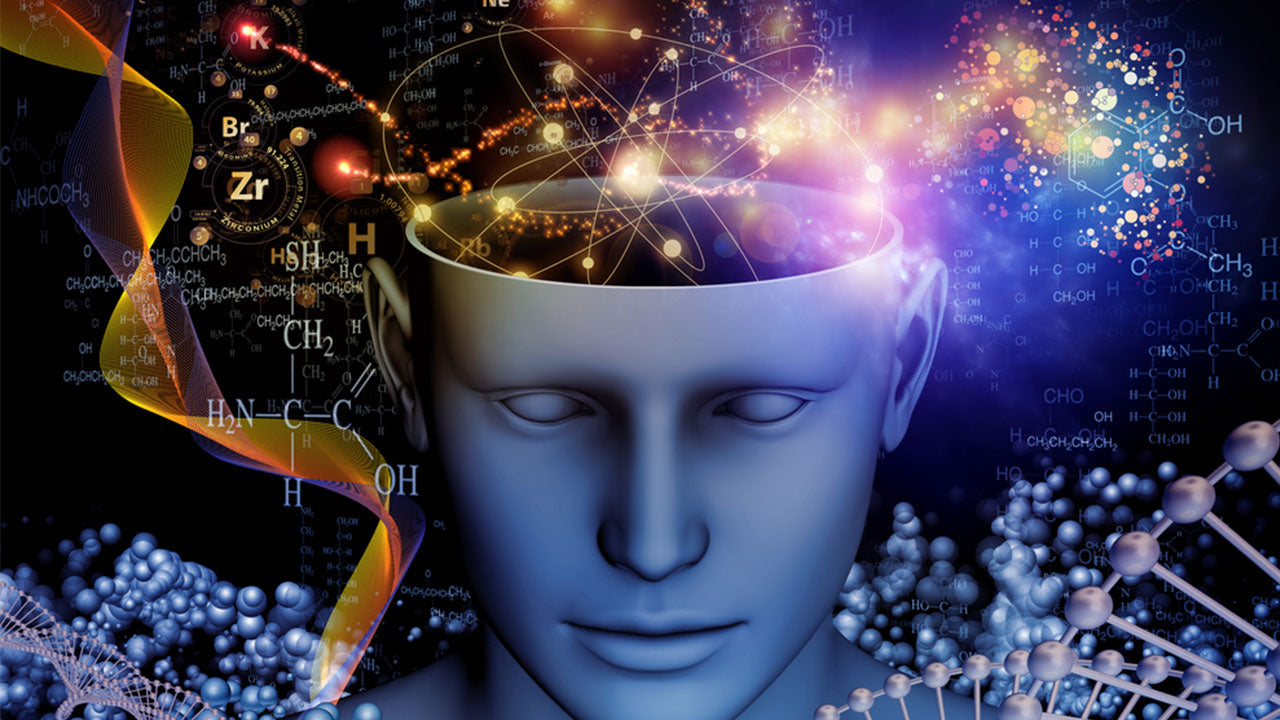Body Repair After Quitting Drinking: How to Naturally Promote Recovery from Alcohol
 By: by Amino Science
By: by Amino Science

Whether alcohol use has reached the level of alcohol addiction, or regular heavy drinking has simply started to take its toll, quitting alcohol is one of the healthiest decisions anyone can make to improve health and quality of life. Drinking too much alcohol can have damaging physical, psychological, and interpersonal effects that could be disastrous or even fatal, but alcohol recovery isn't easy either. If you or a loved one has decided to be alcohol-free, the question now is how to speed up body repair after quitting drinking? How long does it take to detox from the effects of alcohol, and what can you do to minimize withdrawal symptoms and improve the body's health? Read on for natural solutions.
The Symptoms of Alcohol Withdrawal
Depending on your personal level of alcohol dependence, withdrawal symptoms could be mild or severe. In the worst case scenarios, alcohol withdrawal syndrome can include:
- Anxiety
- Nausea
- Tremors
- Headache
- Vomiting
- Rapid heart rate
- Irritability
- Confusion
- Sweating
- Elevated blood pressure
- Insomnia
- Nightmares
- Fever
- Seizures
- Extreme agitation and confusion
- Visual, auditory, and/or tactile hallucinations
These symptoms could start occurring as soon as 6 hours after your last drink and potentially last for weeks. The severest symptoms are part of delirium tremens (DT), the most dangerous level of alcohol withdrawal that should be undergone only in a hospital or rehab setting as part of a substance abuse recovery process.
The National Institute on Alcohol Abuse and Alcoholism has an online questionnaire to help you evaluate your level of alcohol use and better decide your body's ability to quit "cold turkey" or with the aid of a treatment center. This post-acute withdrawal phase is often the hardest part, and the more recovery resources you have, the better your chances of maintaining sobriety and not relapsing the next day because the withdrawal symptoms are too overwhelming.

Body Repair After Quitting Drinking: How To Minimize Withdrawal Symptoms and Recover Faster
What happens to your body when you stop drinking? Is it just one endless hangover? Will the damage done to the stomach lining, kidneys, and liver eventually reverse? Here are the areas you may notice the most dramatic side effects and recovery benefits, and how you can support your recovery after you're done drinking alcohol.
1. Repair Skin Damage
The cartoon image of a drunk is someone hiccuping bubbles and sporting rosy cheeks and a big, red nose. Part of that picture is actually true: regular overconsumption of alcohol damages your skin, making you look older and causing tissue inflammation. There are a few reasons for this.
- Dehydration: Because it's a diuretic, alcohol dehydrates your skin, leading to less elastic skin that can become dry, flaky, and painful.
- Inflammation: The facial flush that occurs when you drink isn't the rosy glow of healthy skin but an inflammatory reaction to poison, almost like a mild allergic rash. While that inflammation will subside when you sober up, repeated inflammation to the area will damage the skin over time and leave a lasting redness. It's also been associated with a higher risk of cancer.
- Aging: New research indicates drinking alcohol prematurely ages your cells, including your skin cells, causing visual signs of premature aging.
Alcohol has long been associated with bad skin, including what was once known as a "drinker's nose" or rhinophyma. Rhinophyma is not directly linked to alcohol as a cause and is in fact a form of rosacea. However, there is research showing that there's a high prevalence of alcohol use among patients with inflammatory skin diseases, and a possible increased risk of basal cell carcinoma linked to alcohol consumption.
The conclusion: alcohol use causes skin damage and premature aging, may worsen other skin conditions, and could increase the risk of skin cancer.
The Solution
Once you quit drinking, what does your skin need most to recover? The first step is adequate, regular hydration, and perhaps a daily moisturizing facial lotion with SPF to protect against sun damage. The second step is to make sure your body has the proper supplies to regenerate new skin and tissue cells, which means amino acids for skin tightening, especially the collagen amino acids that can restore supple, youthful skin. Whether you get them from diet or supplementation, you can't repair or regenerate new tissue without the necessary amino acids.
2. Reduce Risk of Heart Attack
Excessive alcohol consumption has a serious impact on your cardiovascular health, increasing your risk of pulmonary (lung) conditions and heart disease. Heart failure affects up to five million Americans, and the risk of heart failure is nearly doubled for those who drink heavily.
In the previously linked systematic review of studies, the risk of alcohol abuse was found to be so dangerous, the researchers' conclusion stated that although "the current literature provides some evidence for a lower risk of heart failure with light-to-moderate consumption of alcohol <...> it would be premature to recommend light-to-moderate drinking as a means to lower the risk of heart failure, given the possible risk of abuse and resulting consequences."
For all the articles that get passed around about the benefits of drinking red wine for heart health, the risk of over-consuming alcohol is so much greater than the small amount of potential benefit from moderate consumption that it is not recommended.
The conclusion: by quitting alcohol entirely, you significantly reduce your risk for heart disease, heart attack, heart failure, and other cardiovascular and pulmonary conditions.
The Solution
According to the American Heart Association, alcohol use and abuse endangers the heart by increasing the amount of fat (triglycerides) in our bloodstreams. Once you've quit drinking, there are natural ways to help lower cholesterol and blood lipid levels, and aid in your body's clean-up of these substances.
3. Reverse Liver Damage
Our livers are unique organs, able to heal from damage in ways that our hearts (for example) cannot. Because alcohol is an intoxicant, it's up to our livers to process it in order to detox the body, which is why liver disease is a dangerous risk of chronic alcohol abuse.
Consuming large amounts of alcohol can lead to fatty liver disease, alcoholic hepatitis, cirrhosis of the liver, and ultimately liver failure and death. At a certain point the scarring on the liver is so advanced it is irreversible, but there is a large and vitally important window of time when, if you can quit drinking, you can stop the damage in its tracks and allow the liver to heal completely.
The conclusion: alcohol damages the liver, but abstaining can stop the damage and possibly allow it to be reversed.
The Solution
Once alcohol is out of your system, you can help the liver detox and repair itself in a few simple ways: by consuming a liver-flush diet, knowing which key vitamins, supplements, and amino acids aid in liver support, and avoiding intoxicants like alcohol, unnecessary drugs, or exposure to industrial chemicals and preventable diseases like hepatitis. Your liver and kidneys are the only truly natural detoxifiers you have, and in a heavy drinker they are often fatally overtaxed. By quitting alcohol, you can cure your detox organs. We recommend supporting your liver health with Life, our Active Aging blend.
4. Lose Weight and Improve Body Composition
Alcohol leads to higher fat levels in the blood, and therefore alcohol consumption is also associated with higher body weight gain, obesity, and the symptoms that can accompany excess weight like type 2 diabetes, high blood pressure, and metabolic syndrome. Alcohol itself contributes to high calorie consumption, but the calories in alcohol are empty, with no nutritional benefit. Alcohol is processed and stored just like sugar, and like a diet high in refined sugar, it's closely associated with dangerous weight gain and obesity.
While there's no direct correlation between the amount of alcohol consumed and the amount of weight gained due to each of us having our own individual metabolism rates, it's nevertheless true that reducing or eliminating alcohol intake helps lead to successful weight loss and long-term weight-loss management in those with diabetes, as well as avoiding weight gain in the first place.
The conclusion: alcohol can contribute to weight gain and obesity, while abstaining can aid in weight loss.
The Solution
Once you're sober, proper diet and exercise are still the first and foremost ways to safely lose weight and maintain a healthy body composition. You'll also want to control for hunger cravings, especially if alcohol addiction is at play. Eating can be an addiction much like drinking, the main difference being that you have to eat every day, while those who are addicted to other substances can remove the temptation entirely. By eating nutritionally dense and filling meals full of the protein and amino acids necessary to build muscle and lose weight, you can avoid the dangers of obesity and regain your optimal fitness.
5. Support Energy and Sleep
Energy levels and proper rest are two sides of the same coin. Because alcohol acts like sugar in the body, the comedown from sobering up can lead to fatigue and energy crashes not unlike drops in blood sugar. This encourages people to overeat or return to drinking despite their best intentions to quit—it's an effort to correct that crash and regain the rush.
On the flip side, because alcohol also interrupts the brain activity associated with rest, memory creation, and waking, it disrupts normal sleep patterns. Just as so-called "blackout drunks" can be manically active and then wake up with no memory of what they did or said, even more moderate drinkers will experience poor sleep quality due to conflicting brain activities that prevent them from entering into deep REM sleep.
The conclusion: While drinking, you sleep without getting the benefits of "dream sleep" and the neurological function it provides. When newly sober, one of the most maddening side effects can be sometimes long-lasting insomnia that further depletes already low energy levels.
The Solution
While there are sleep aids you can take to chemically induce sleep, they are not recommended for those whose sleep issues are due to coming down from a chemical alcohol dependence in the first place. There are certain natural nutrients and amino acids for insomnia you can explore, pre-bed rituals you can adopt to retrain your brain for regular sleep, and even more amino acids to help boost your daily energy as your body recalibrates to a non-toxic state.
The Amazing Attributes of Abstinence
Now you have an idea of what the body must go through to repair itself once you quit drinking, plus the various ways you can support a natural recovery. Keep in mind that alcohol's effects don't stop at damage to your body, and thus quitting drinking can improve even more aspects of your life: alcohol detox and abstinence can save you money, can save your relationships from the consequences of binge drinking, and can help save your overall emotional and mental health going forward.

Up to 25% off Amino
Shop NowTAGS: illness
Join the Community
Comments (0)
Most Craveable Recipes




 833-264-6620
833-264-6620



















